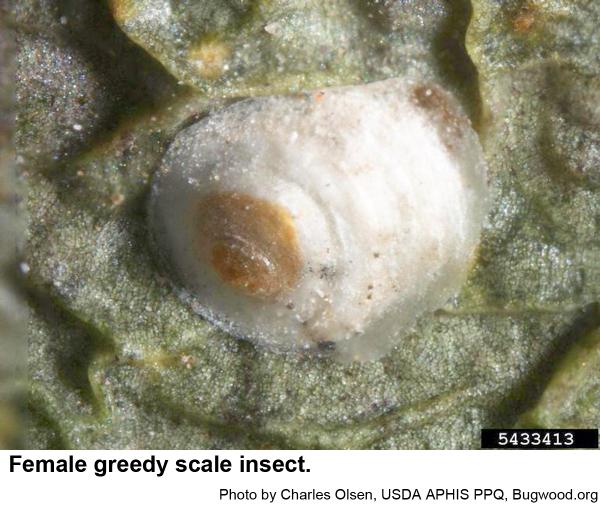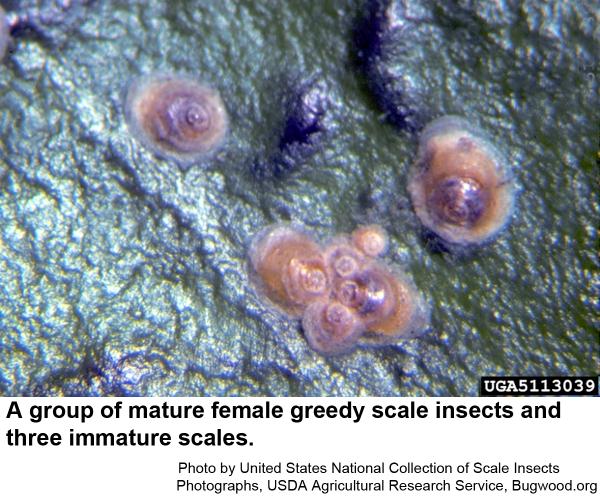Description and Biology
Greedy scale, Hemiberlesia rapax, is an armored scale pest of woody ornamentals and fruits world wide. Females are essentially tiny (about 1/16 inch), clear yellow blobs except for long, very slender mouthparts they use to penetrate into their host stems and leaves to suck out juice. Their brown or grayish to white armor has concentric lines resulting from the molted skins and armors of the earlier juvenile stages. These molted skins are usually slightly off center. Females deposit clusters of 30 to 50 yellow eggs inside their armor. From the eggs hatch tiny crawlers, the only mobile stage other than adult males. Crawlers are readily blown about in the landscape or accidentally carried from host to host by insects and birds. Once a crawler finds a suitable place to insert its mouthparts, the insect does not move again as it feeds, secretes armor, molts, and grows. We have at least two generations per year in North Carolina although in greenhouses greedy scales reproduce continually. Encarsia citrina and other tiny parasitic wasps help keep greedy scales in check except where vagaries of weather or insecticides applied for other pests eliminate these beneficial wasps.
Host Plants
Greedy scale has been collected from hundreds of ornamental, fruit, and weed hosts. Familiar ornamentals include Abelia, azalea, bays, burning bush, cameillia, chinaberry, Elaeagnus, fig, geranium, hollies, honeysuckle, morning glory, mulberry, junipers, oak, pear, pecan, persimmon, privet, rhododendron, rose, wax myrtle, and yew.
Residential Recommendations
Because of their low toxicity to humans, pets, and wildlife other than insects, horticultural oils are appropriate insecticides for armored scale management. Several brands of oils are on the market. Horticultural oils are moderately toxic to armored scales, soft scales, aphids, and mites. Furthermore, these oils leave little toxic residue behind to threaten beneficial insects and mites that prey upon various kinds of scale insects.
Other Resources
- Armored Scale Identification and Management on Ornamental Plants. Frank, S. 2010. Entomology Insect Notes, NC State Extension Publications.
- Florida Armored Scale Insects. Dekle, G. W. 1965. Arthropods of Florida and Neighboring Land Areas, Vol 3. 265 pp.
- Hemiberlesia rapax (greedy scale (USA)). Anonymous. After 2009. CABI Invasive Species Compendium.
- Horticultural Oils for Ornamental Plants. Frank, S., J. R. Baker and S. B. Bambara. 2018. Entomology Insect Notes, NC State Extension Publications.
- Seasonal abundance of greedy scale (Homoptera: Diaspididae) and associated parasitoids on taraire (Beilschmiedia tarairi). Blank R. H., G.S. C. Gill, and M. H. Olson, 1995. Journal of Economic Entomology, 88(6):1634-1640.
- Extension Plant Pathology Publications and Factsheets
- Horticultural Science Publications
- North Carolina Agricultural Chemicals Manual
For assistance with a specific problem, contact your local N.C. Cooperative Extension Center.
This Factsheet has not been peer reviewed.
Publication date: Nov. 5, 2018
Reviewed/Revised: Sept. 20, 2019
Recommendations for the use of agricultural chemicals are included in this publication as a convenience to the reader. The use of brand names and any mention or listing of commercial products or services in this publication does not imply endorsement by NC State University or N.C. A&T State University nor discrimination against similar products or services not mentioned. Individuals who use agricultural chemicals are responsible for ensuring that the intended use complies with current regulations and conforms to the product label. Be sure to obtain current information about usage regulations and examine a current product label before applying any chemical. For assistance, contact your local N.C. Cooperative Extension county center.
N.C. Cooperative Extension prohibits discrimination and harassment regardless of age, color, disability, family and marital status, gender identity, national origin, political beliefs, race, religion, sex (including pregnancy), sexual orientation and veteran status.


